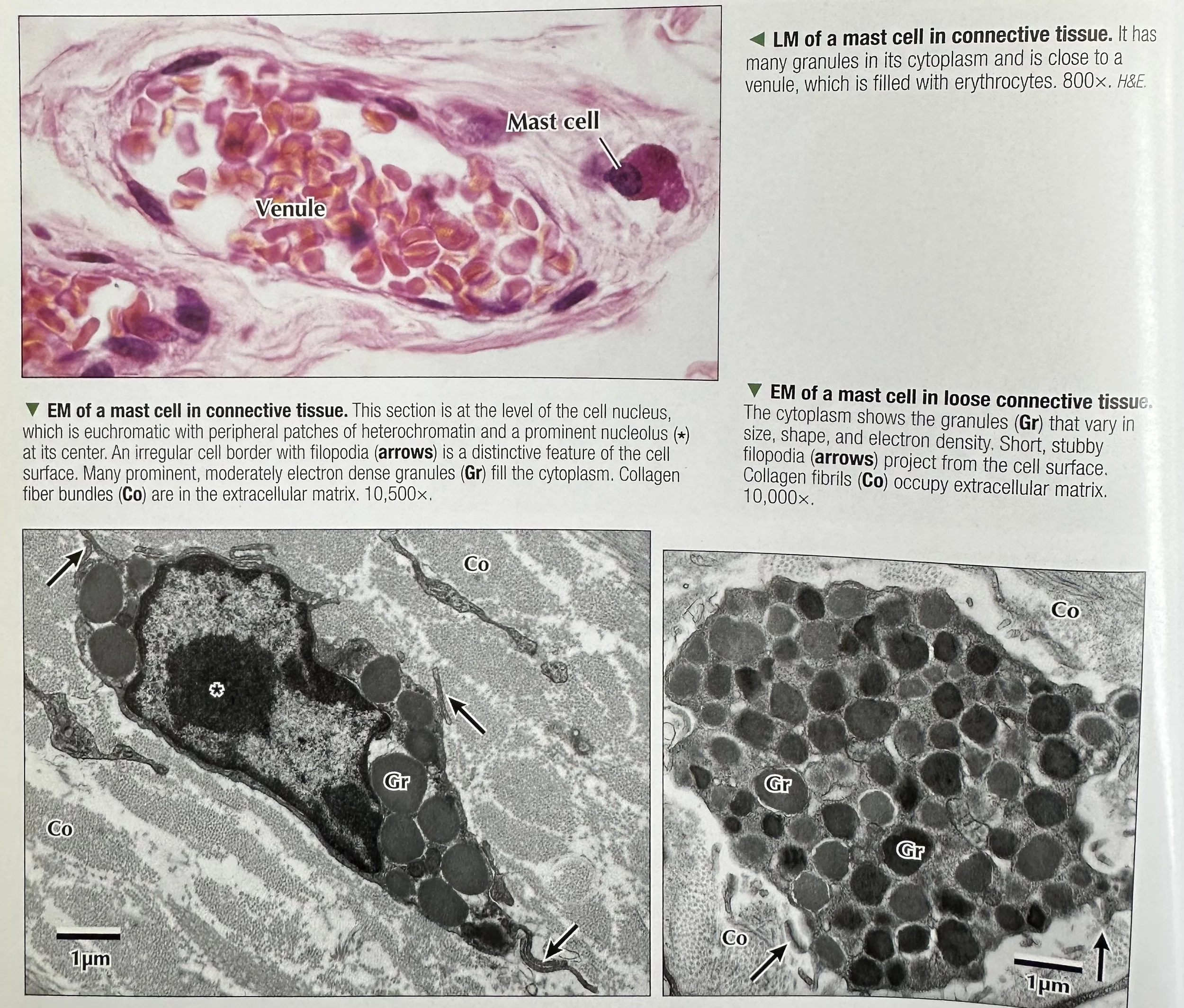Mast Cell Dysfunction
What are Mast Cells and what are their functions?
As the oldest of the white blood cell lines, they aid in immune support and combating foreign pathogens (especially parasites). They aid in the development of immune tolerance and adaptive defense as well as in autoimmunity. They assist in wound healing, tissue development and remodeling, metabolism, and are involved in other pathways. Think of them as the first responders of our immune systems.
The ways they do this is by releasing mediators (aka messengers) including histamine, heparine, TNF-alpha, elastase 2, tryptase, and kallikrein.
Mast cells are rare in the blood, found in the inside of lymphatics and capillaries and in the gut and skin. In the chronically ill, mast cells become chronically "on" and deliver less than ideal downstream effects.
Mast cells with various stains (Netter's Essential Histology, 2008, pg 62)
When they go bad we call it mast cell activation syndrome (MCAS) or disease (MCAD)
Environmental triggers cue for the rise of mutant mast cells to secrete the above mediators in an uncontrolled way. These mutant mast cells activate normal mast cells to secrete more mediators and this process signals further normal mast cells to secrete mediators themselves. It becomes a vicious cycle of tremendous amounts of inflammation with a wide spectrum of severity. Experts like Dr. Afrin estimate that about 17% prevalence of MCAS and some studies report an incidence 1/10,000, though of note that there is very limited data at current.
What environmental triggers set this off? Infections (EBV, tickborne illnesses, etc), COVID-19 infection, mold and mycotoxins, dysbiosis (think: antibiotic use), SIBO, stress, hormone imbalance, pregnancy, toxic metal exposure, chemical exposure and certain medications (including ibuprofen!) are all known triggers.
A not so fun fact: MCAS/MCAD is present in 40-50% of all Lyme patients 🤯
What does it all look like?
Usually patient with a multitude of complaints in multiple systems. Symptoms can show up chronically or in a waxing/waning pattern. I almost hesitate to share common symptoms, as honestly, they can look like a lot of stuff, but here's a non-exhaustive list of possible symptoms:
Skin issues like rashes, hives, and itching
Headaches and migraines
Eye irritation: especially the feeling of a foreign body in eye
Hot bath or sauna intolerance
GI issues including heartburn, constipation, abdominal pain, alternating diarrhea and constipation, difficulty swallowing, oral irritation or sores
Anxiety and depression
Brain fog and cognitive impairment
Cough, shortness of breath
Hormonal imbalances
What do we see it go along with?
MCAS/MCAD is a symptom of a deeper problem and is can be connected to conditions like Ehlers-Danlos Syndrome (EDS), Postural Orthostatic Tachycardia Syndrome (POTS), Chronic Fatigue Syndrome/Myalgic Encephalomyelitis (CFS/ME), Fibromyalgia, Autoimmune conditions, Multiple Chemical Sensitivity (MCS), Allergies and Asthma
Diagnosis can be challenging
MCAS is exceptionally tricky to diagnose in part due to it’s affects on so many body systems. Our mainstream model of medicine has us visiting silo-ed providers and specialists. You see the allergist for allergies, the GI specialist for GI concerns, but what happens when you have overlapping symptoms? Rarely are those dots connected together. On top of that, MCAS is relatively unknown amongst providers despite achieving an official diagnosis in 2016. This also contributes to the stigma that patients can face when asking about it in general.
The formal diagnosis includes two parts: a major and minor criteria.
An infographic describing the major and minor criteria for MCAS diagnosis.
It’s a puzzle with pieces that don’t always fit the usual medical framework. My advice? Keep advocating for yourself, find a team of providers who will listen to you, and are willing to walk the path with you. If you’re ready to get started in determining if mast cells are a player in your health, click here.
In an upcoming blog we will discuss treatment including steps you can take today to support healthy mast cells. Stay tuned!

